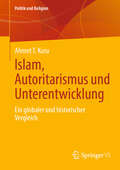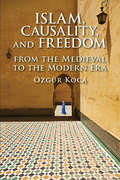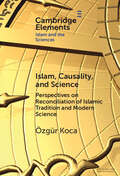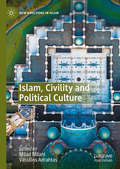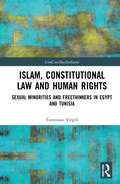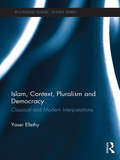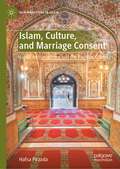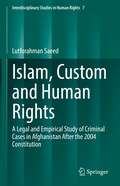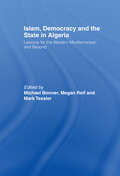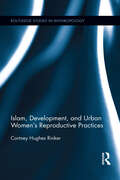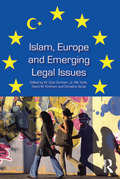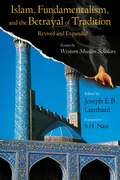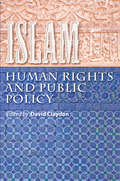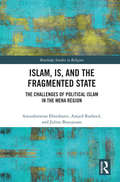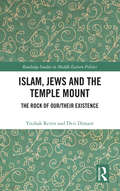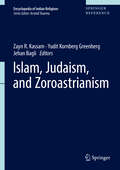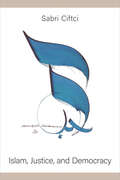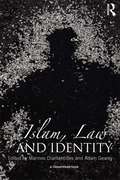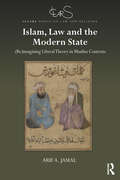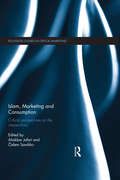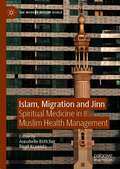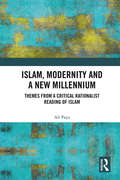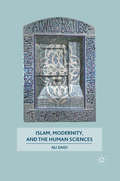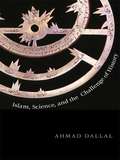- Table View
- List View
Islam, Autoritarismus und Unterentwicklung: Ein globaler und historischer Vergleich (Politik und Religion)
by Ahmet T. KuruWarum weisen Länder mit muslimischer Bevölkerungsmehrheit im Vergleich zum Weltdurchschnitt ein niedriges Maß an Demokratie und sozioökonomischer Entwicklung auf? Dieses Buch kritisiert Erklärungen, die den Islam als Ursache dieser Ungleichheit anführen, da die Muslime zwischen dem 9. und 12. Jahrhundert philosophisch und sozioökonomisch weiter fortgeschritten waren als die Westeuropäer. Auch der westliche Kolonialismus war nicht die Ursache: Die Muslime litten bereits unter politischen und sozioökonomischen Problemen, als die Kolonisierung begann. Dieses Buch argumentiert, dass die Muslime in ihrer frühen Geschichte, als in Europa religiöse Orthodoxie und Militärherrschaft vorherrschten, einflussreiche Denker und Kaufleute hatten. Im 11. Jahrhundert entstand jedoch ein Bündnis zwischen orthodoxen islamischen Gelehrten (den Ulema) und Militärstaaten. Dieses Bündnis erstickte allmählich die intellektuelle und wirtschaftliche Kreativität, indem es die intellektuellen und bürgerlichen Klassen in der muslimischen Welt marginalisierte. Dieses Bündnis behindert auch heute noch Kreativität und Wettbewerb in muslimischen Ländern. Die Rohfassung der deutschen Übersetzung hat ein maschinelles Übersetzungsprogramm mit Hilfe künstlicher Intelligenz angefertigt. Eine anschließende menschliche Überarbeitung erfolgte vor allem in inhaltlicher Hinsicht, so dass sich das Buch stilistisch anders lesen wird als eine herkömmliche Übersetzung.
Islam, Causality, and Freedom: From the Medieval to the Modern Era
by Özgür KocaIn this volume, Ozgur Koca offers a comprehensive survey of Islamic accounts of causality and freedom from the medieval to the modern era, as well as contemporary relevance. His book is an invitation for Muslims and non-Muslims to explore a rich, but largely forgotten, aspect of Islamic intellectual history. Here, he examines how key Muslim thinkers, such as Ibn Sina, Ghazali, Ibn Rushd, Ibn Arabi, Suhrawardi, Jurjani, Mulla Sadra and Nursi, among others, conceptualized freedom in the created order as an extension of their perception of causality. Based on this examination, Koca identifies and explores some of the major currents in the debate on causality and freedom. He also discusses the possible implications of Muslim perspectives on causality for contemporary debates over religion and science.
Islam, Causality, and Science: Perspectives on Reconciliation of Islamic Tradition and Modern Science (Elements in Islam and Science)
by Özgür KocaThis Element intends to contribute to the debate between Islam and science. It focuses on one of the most challenging issues in the modern discussion on the reconciliation of religious and scientific claims about the world, which is to think about divine causality without undermining the rigor and efficacy of the scientific method. First, the Element examines major Islamic accounts of causality. Then, it provides a brief overview of contemporary debates on the issue and identifies both scientific and theological challenges. It argues that any proposed Islamic account of causality for the task of reconciliation should be able to preserve scientific rigor without imposing a priori limits on scientific research, account for miracles without turning them into science-stoppers or metaphors, secure divine and creaturely freedom, and establish a strong sense of divine presence in the world. Following sections discuss strengths and weaknesses of each account in addressing these challenges.
Islam, Civility and Political Culture (New Directions in Islam)
by Milad Milani Vassilios AdrahtasThis book provides a comprehensive and interdisciplinary exploration of civility and political culture in the Muslim world.The contributions consider the changing interface between religion and politics throughout Islamic history, and into the present. Extending beyond saturated approaches of ‘political’ and/or ‘militant’ Islam, this collection captures the complex sociopolitical character of Islam, and identifies tensions between the political-secular and the sacred-religious in contemporary Muslim life. The alternative conceptual framework to traditional analyses of secularisation and civility presented across this volume will be of interest to students and scholars across Islamic studies, religious studies, sociology and political science, civilisation studies, and cultural studies.
Islam, Constitutional Law and Human Rights: Sexual Minorities And Freethinkers In Egypt And Tunisia (Comparative Constitutionalism in Muslim Majority States)
by Tommaso VirgiliThis book focuses on Islamic constitutionalism, and in particular on the relation between religion and the protection of individual liberties potentially clashing with shariᶜa and the Islamic ethos. The analysis goes from general to particular, starting with a theoretical overview on constitutionalism, human rights and Islam, moving to the assessment of the post-Arab Spring Constitutions of Egypt and Tunisia, and concluding with a specific focus on the rights of sexual minorities and freethinkers. Part I provides a theoretical account of the conception of constitutionalism and human rights in Islam, compared and contrasted with Western constitutionalism. A set of issues where the tension between shariᶜa and human rights is accentuated is analysed against the backdrop of the main Islamic charters of rights. Part II conducts a similar assessment based on the Constitutions of Tunisia and Egypt – the two main epicentres of the Arab Spring. Part III moves to two specific rights in the same countries, from the twofold perspective of the Constitutions and international law: the freedom from interference in one’s intimate life, with particular regard to homosexuality; and the freedom of holding and expressing nonconventional beliefs, deemed unacceptable from the point of view of traditional Islam. These issues have been chosen as representative of the most controversial, still considered taboo in both legal and social terms, hence at the fringes of the debate on individual freedoms. Focusing on two overlooked and underexplored issues, the work thus pushes the boundaries of the human rights discourse in Muslim contexts.
Islam, Context, Pluralism and Democracy: Classical and Modern Interpretations (Routledge Islamic Studies Series)
by Yaser EllethyIslam, Context, Pluralism and Democracy aspires to clarify the tensions and congruences between the revelational and the rational, the text and the context, the limits and the horizons of contextualization in Islam, as these emanate from the Islamic interpretative tradition. This book examines classical and modern Muslim interpretations with regard to the concepts of diachronic development, pluralism and democracy based on Arabic-Islamic sources and literature. Focusing on the parameters of semantic changes, methods of interpretation and cultural variables, it shows how this interpretative tradition offers a diversity of ideas and approaches that can be utilized in contemporary debates concerning the socio-political contextualization of Islamic genuine thought. However, within this diversity, Islam presents generic principles and core values as 'moral paradigms' that can deal with such modern challenges. Based on the analysis of core Islamic texts and key-terms related to the discussed issues, mainly from the Quran and the Sunnah, and the broader Arabic-Islamic literature, it explores the boundaries of the mutable and constant in the Islamic worldview. Presenting classical Muslim interpretations and scholars as possible interlocutors in debates over the compatibility of Islam with challenges of modernity, this book is essential reading for researchers and postgraduates interested in Islamic Studies, Philosophy of Religion and Political Science.
Islam, Culture, and Marriage Consent: Hanafi Jurisprudence and the Pashtun Context (New Directions in Islam)
by Hafsa PirzadaThis book presents an empirical examination of consent-seeking among Pashtun Muslims in the Pakistani province of Khyber Pakhtunkhwa (KPK), to determine whether cultural norms and beliefs have largely come to diverge from the principles of consent in Islamic law and jurisprudence. Is culture part of the ‘inevitable decay’ to which Max Müller says every religion is exposed? Or – if rephrased in terms of the research encapsulated within this book – are cultural beliefs and practises the inevitable decay to which Islam has been exposed in Muslim societies? Drawing on interviews with Muslims in Pakistan and Australia, the research broadly broaches questions around the rights of women in Islam and contributes to a wider understanding of Muslim social, cultural, and religious practices in both Muslim majority nations and diaspora communities. The author disentangles cultural practices from both religious and universal legal principles, demonstrating how consent seeking in Pashtun culture generally does not reflect the spirit or the intent of consent as described in Hanafī law and jurisprudence. This research will be of interest to students and scholars across sociology, anthropology, socio-legal studies, and law, with a focus on Islamically-justified law reform in Muslim nation states.
Islam, Custom and Human Rights: A Legal and Empirical Study of Criminal Cases in Afghanistan After the 2004 Constitution (Interdisciplinary Studies in Human Rights #7)
by Lutforahman SaeedFor the first time, the author has explored the intertwinement of written law, Islamic law, and customary law in the highly complex Afghan society, being deeply influenced by traditional cultural and religious convictions. Given these facts, the author explores how to bridge the exigencies of a human rights–driven penal law and conflicting social norms and understandings by using the rich tradition of Islamic law and its possible openness for contemporary rule of law standards. This work is based on ample field research in connection with a thorough analysis of the normative contexts. It is a landmark, since it offers broadly acceptable and thus feasible solutions for the Afghan legal practice. The book is of equal interest for scientists and practitioners interested in legal, religious, social, and political developments concerning human rights and regional traditions in the MENA region, in Afghanistan in particular.
Islam, Democracy and the State in Algeria: Lessons For The Western Mediterranean And Beyond
by Mark Tessler Michael Bonner Megan ReifModern Algeria has been, in many ways, a harbinger of events and trends that have affected the Arab and Muslim worlds. The country's bold experiment in democratization broke down in the early 1990s, largely over the question of whether the Islamic Salvation Front (FIS) should be permitted to come to power following its victories in local, regional, and national elections. A devastating civil war followed. Now that order has been restored and the country has a new government, questions about governance, Islam and international relationships are once again at the top of Algeria's political agenda. How these issues are resolved will not only determine Algeria's future, but will also have important implications for other states in North Africa and the western Mediterranean.This book was previously published as a special issue of the Journal of North African Studies.
Islam, Democracy, and Cosmopolitanism
by Ali Mirsepassi Tadd Graham FernéeThis book presents a critical study of citizenship, state and globalization in societies that have been historically influenced by Islamic traditions and institutions. Interrogating the work of contemporary theorists of Islamic modernity such as Mohammed Arkoun, Abdul an-Na'im, Fatima Mernissi, Talal Asad, Saba Mahmood and Aziz Al-Azmeh, this book explores the debate on Islam, democracy and modernity, contextualized within contemporary Muslim lifeworlds. These include contemporary Turkey (following the 9/11 attacks and the onset of war in Afghanistan), multicultural France (2009–10 French burqa debate), Egypt (the 2011 Tahrir Square mass mobilizations), and India. Ali Mirsepassi and Tadd Graham Fernée critique particular counterproductive ideological conceptualizations, voicing an emerging global ethic of reconciliation. Rejecting the polarized conceptual ideals of the universal or the authentic, the authors critically reassess notions of the secular, the cosmopolitan and democracy. Raising questions that cut across the disciplines of history, anthropology, sociology and law, this study articulates a democratic politics of everyday life in modern Islamic societies.
Islam, Development, and Urban Women's Reproductive Practices (Routledge Studies in Anthropology #9)
by Cortney Hughes RinkerDrawing on fieldwork conducted in Rabat, Morocco, this ethnography analyzes the relationship between neoliberal development policies, women’s reproductive practices, and popular understandings of Islam. In the 1990s, Morocco shifted its attention from economic to human development, as economic reforms in the preceding decades ultimately did not address social issues such as access to healthcare and education and poverty. Development programs like the National Initiative for Human Development seek to create modern citizens who are responsible, self-sustaining, and will make choices that better their well being. Hughes Rinker considers the implications that the reorientation from primarily economic to social development has on reproductive healthcare. Drawing on observations in health clinics; interviews with patients, medical staff, and at government and development agencies; and a document analysis, she demonstrates how women appropriate the medical practices and spaces of intervention aimed at creating modern citizens to form new religious identities, novel ideas of motherhood, and interpretations of neoliberal citizenship based on Islamic beliefs. Women’s interpretations of Islam are not incompatible with the state’s agenda for modernization, but rather serve as rationale for women to accept modern reproductive practices, such as contraception and pregnancy tests. However, even though female patients appropriate medical practices, they reinscribe development tropes that suggest they participate in modernization through their reproductive bodies and mothering instead of their productive labor. Hughes Rinker complicates neoliberalism as she shows it is unproductive to have a set conceptualization of neoliberal citizens, and more productive to examine the practices and discourses that create such citizens.
Islam, Europe and Emerging Legal Issues
by W. Cole Durham Rik TorfsIslam, Europe and Emerging Legal Issues brings together vital analysis of the challenges that Europe poses for an expanding Islam and that Islam poses for Europe, within their ever-evolving religious, legal, and social environments. This book gathers some of the best thinking on Islam and the law affecting current and contested issues that can no longer be ignored, particularly as they have found their way before the European Court of Human Rights. Contributors include leading authorities who are working at the heart of this generation's law and religion questions in Europe and across the world. This book outlines implications for all those who look to Europe-from both within and without-for models of human rights implementation and multi-cultural accommodation.
Islam, Fundamentalism, and the Betrayal of Tradition, Revised and Expanded: Essays by Western Muslim Scholars
This fully revised edition of the critically acclaimed book contains a series of essays that explain the misconceptions that lie at the heart of Western attitudes towards Islam. Including a new essay on the role of women in Islam, an updated chapter containing insights into the concept of Jihad, and three fully revised chapters that bring the discussion up-to-date with the current global situation, this book is a must read for anyone interested in Islam and its relation to the West.
Islam, Human Rights and Public Policy: Human Rights And Public Policy
by Daniel Pipes John Arnold John Azumah Paul Stenhouse Patrick Sookhdeo David Claydon Peter Day Kit Wiley Rosemary Sookhdeo Elizabeth Kendal Michael Nazir-Ali Abdullah Bahri John Harrower Mark DurieIn this ground-breaking Australian book, a diverse group of international writers, scholars and commentators shed light on some of the most pressing human rights and public policy challenges of our time. Contributors include thinkers of Muslim background with extensive personal experience in developing countries, and Western writers of both secular and religious orientation. Individual essays deal with the human rights of Muslims and non-Muslims alike, in areas ranging from women's rights to freedom of religion. Another valuable focus is on the challenges of adaptation that immigrant Muslim communities in the West face, as do non-Muslims as they seek to understand and come to terms with different Muslim world views. Contentious areas of debate such as the sources of religious violence, and the implications of so-called Islamisation are not avoided but addressed with openness, honesty and candour. Other specific topics include multi-faith dialogue, Islamic finance, and the nature of Islamic law (Sharia). The book concludes with a set of practical, concrete recommendations for individuals directly involved in setting relevant public policies. 'Islam, Human Rights and Public Policy' is an indispensable handbook for all Western policy makers.
Islam, IS and the Fragmented State: The Challenges of Political Islam in the MENA Region (Routledge Studies in Religion)
by Juline Beaujouan Amjed Rasheed Anoush EhteshamiThis book provides a pioneering and original study of the regional effects of political Islam. It sets out the multifaceted interactions between Islam and politics in the Middle East and North Africa (MENA) region, focussing in particular on the so-called Islamic State (IS) organization in its broad discussion of political Islam. Utilizing a trans-disciplinary perspective, the book interacts with social constructivism and complex realism theories to analyse the clash between the modern notion of the state and that of identity in the region. Looking at issues such as the rise of IS and its attempts to establish a caliphate, the book offers three different, yet complementary, levels of analysis for its discussion. These being: Regional (dis)order, the erosion of state power and its boundaries, and the role of non-state actors in shaping the politics of the MENA region. Each of these levels are addressed in detail in turn in order to build a comprehensive picture of state and political Islam in the Arab core of the MENA region. What emerges is a comprehensive analysis of the interlinked relationships between political and Islamic elements of Arab polities and societies. As such, this book will be of great interest to academics and policymakers focusing on matters relating to the study of Islam, Islam and politics, study of religion more broadly, and security studies and area studies, particularly in the MENA region.
Islam, Jews and the Temple Mount: The Rock of Our/Their Existence (Routledge Studies in Middle Eastern Politics)
by Yitzhak Reiter Dvir DimantThis study presents the first comprehensive survey of the abundant early Islamic sources that recognize the historical Jewish bond to the Temple Mount (Masjid al-Aqsa) and Jerusalem. Analyzing these sources in light of the views of contemporary Muslim religious scholars, thinkers and writers, who – in the context of the Arab-Israeli conflict – deny any Jewish ties to the Temple Mount and promote the argument that no Jewish Temple ever stood on the Temple Mount. The book describes how this process of denying Jewish ties to the site has become the cultural rationale for UNESCO decisions in recent years regarding holy sites in Jerusalem, Bethlehem and Hebron, which use Muslim Arabic terminology and overlook the Jewish (and Christian) history and sanctification of these sites. Denying the Jewish ties to the Temple Mount for political purposes inadvertently undermines the legitimacy of Islam’s sanctification of Al-Aqsa and the Dome of the Rock as well as the credibility of the most important sources in Arabic, which constitute the classics of Islam and provide the foundation for its culture and identity. Identifying and presenting the Jewish sources in the Bible, Babylonian Talmud and exegesis on which these Islamic traditions are based, this volume is a key resource for readers interested in Islam, Judaism, religion and political science and history in the Middle East.
Islam, Judaism, and Zoroastrianism (Encyclopedia of Indian Religions)
by Zayn R. Kassam Yudit Kornberg Greenberg Jehan BagliThe earlier volume in this series dealt with two religions of Indian origin, namely, Buddhism and Jainism. The Indian religious scene, however, is characterized by not only religions which originated in India but also by religions which entered India from outside India and made their home here. Thus religious life in India has been enlivened throughout its history by the presence of religions of foreign origin on its soil almost from the very time they came into existence. This volume covers three such religions—Zoraoastrianism, Judaism, and Islam . In the case of Zoraostianism, even its very beginnings are intertwined with India, as Zoroastrianism reformed a preexisting religion which had strong links to the Vedic heritage of India. This relationship took on a new dimension when a Zoroastrian community, fearing persecution in Persia after its Arab conquest, sought shelter in western India and ultimately went on to produce India’s pioneering nationalist in the figure of Dadabhai Naoroji ( 1825-1917), also known as the Grand Old Man of India. Jews found refuge in south India after the destruction of the Temple by the Romans in 70 C.E. and have remained a part of the Indian religious scene since then, some even returning to Israel after it was founded in 1948. Islam arrived in Kerala as soon as it was founded and one of the earliest mosques in the history of Islam is found in India. Islam differs from the previously mentioned religions inasmuch as it went on to gain political hegemony over parts of the country for considerable periods of time, which meant that its impact on the religious life of the subcontinent has been greater compared to the other religions. It has also meant that Islam has existed in a religiously plural environment in India for a longer period than elsewhere in the world so that not only has Islam left a mark on India, India has also left its mark on it. Indeed all the three religions covered in this volume share this dual feature, that they have profoundly influenced Indian religious life and have also in turn been profoundly influenced by their presence in India.
Islam, Justice, and Democracy (Religious Engagement in Democratic Politics)
by Sabri CiftciJustice (al-‘adl) is one of the principal values of the Islamic faith. In Islam, Justice, and Democracy, Sabri Ciftci explores the historical, philosophical, and empirical foundations of justice to examine how religious values relate to Muslim political preferences and behavior. He focuses on Muslim agency and democracy to explain how ordinary Muslims use the conceptions of divine justice—either servitude to God or exercising free will against oppressors—to make sense of real-world problems. Using ethnographic research, interviews, and public opinion surveys as well as the works of Islamist ideologues, archives of Islamist journals, and other sources, Ciftci shows that building contemporary incarnations of Islamist justice is, in essence, a highly practical political project that has formative effects on Muslim political attitudes. Islam, Justice, and Democracy compares the recent Arab Spring protests to the constitutionalist movements of the nineteenth and twentieth centuries in the Middle East to demonstrate the continuities and rifts a century apart. By putting justice at the center of democratic thinking in the Muslim world, Ciftci reconsiders Islam's potential in engendering both democratic ideals and authoritarian preferences.
Islam, Law and Identity
by Adam Gearey Marinos DiamantidesThe essays brought together in Islam, Law and Identity are the product of a series of interdisciplinary workshops that brought together scholars from a plethora of countries. Funded by the British Academy the workshops convened over a period of two years in London, Cairo and Izmir. The workshops and the ensuing papers focus on recent debates about the nature of sacred and secular law and most engage case studies from specific countries including Egypt, Israel, Kazakhstan, Mauritania, Pakistan and the UK. Islam, Law and Identity also addresses broader and over-arching concerns about relationships between religion, human rights, law and modernity. Drawing on a variety of theoretical and empirical approaches, the collection presents law as central to the complex ways in which different Muslim communities and institutions create and re-create their identities around inherently ambiguous symbols of faith. From their different perspectives, the essays argue that there is no essential conflict between secular law and Shari`a but various different articulations of the sacred and the secular. Islam, Law and Identity explores a more nuanced and sophisticated understanding of the tensions that animate such terms as Shari`a law, modernity and secularization
Islam, Law and the Modern State: (Re)imagining Liberal Theory in Muslim Contexts (ICLARS Series on Law and Religion)
by Arif A. JamalWithin the global phenomenon of the (re)emergence of religion into issues of public debate, one of the most salient issues confronting contemporary Muslim societies is how to relate the legal and political heritage that developed in pre-modern Islamic polities to the political order of the modern states in which Muslims now live. This work seeks to develop a framework for addressing this issue. The central argument is that liberal theory, and in particular justice as discourse, can be normatively useful in Muslim contexts for relating religion, law and state. Just as Muslim contexts have developed historically, and continue to develop today, the same is the case with the requisites of liberal theory, and this may allow for liberal choices to be made in a manner that is not a renunciation of Muslim heritage.
Islam, Marketing and Consumption: Critical Perspectives on the Intersections (Routledge Studies in Critical Marketing)
by Aliakbar Jafari Özlem SandikciIn recent years, a critically oriented sub-stream of research on Muslim consumers and businesses has begun to emerge. This scholarship, located both within and outside the marketing field, adopts a socio-culturally situated approach to Islam and investigates the complex and multifaceted intersections between Islam and markets. This book seeks to reflect various unheard and emerging critical voices from within the Muslim world, and provide a series of critical insights on how, if and why Islam matters to marketing theory and practice. It questions the existing assumptions and polarising discussions which underpin the portrayal of Islam as the ‘other’ of Modernity, while acknowledging that Muslims themselves are partially responsible for creating stereotyped representations of Islam and ‘the Muslim’. This wide-ranging and insightful collection will advance emerging critical perspectives, and provide new insights that will influence the generation and application of knowledge in the context of Muslim societies. It will open up fresh conversations for scholars in marketing as well as the broader humanities and social sciences.
Islam, Migration and Jinn: Spiritual Medicine in Muslim Health Management (The Modern Muslim World)
by Birgit Krawietz Annabelle BöttcherThis book explores the agency of Jinn, the so-called “demons of Islam”. They are regarded as mostly invisible and highly mobile creatures. In a globalized world with manifold forms of forced and voluntary migrations, Jinn are likewise on the move, interfering in the human world and affecting the mental and physical health of Muslims. This continuous challenge has so far been mainly addressed by traditional Muslim health management and by the so-called spiritual medicine or medicine of the Prophet. This book shifts perspective. Its interdisciplinary chapters deal with the transformation of manifold cultural resources by first analyzing the doctrinal and cultural history of Jinn and the treatment of Jinn affliction in Arabic texts and other sources. It then discusses case studies of Muslims and current health management approaches in the Middle East, namely in Egypt and Syria. Finally, it turns to the role of Jinn in a number of migratory settings such as Spain, Denmark, Great Britain and Guantanamo.
Islam, Modernity and a New Millennium: Themes from a Critical Rationalist Reading of Islam
by Ali PayaAs the world becomes increasingly globalised Islam faces some important choices. Does it seek to "modernise" in line with the cultures in which it is practised, or does it retain its traditions even if they are at odds with the surrounding society? This book utilizes a critical rationalist viewpoint to illuminate many of the hotly contended issues in modern Islam, and to offer a fresh analysis. A variety of issues within Islam are discussed in this book including, Muslims and modernity; Islam, Christianity and Judaism; approaches to the understanding of the Quran; Muslim identity and civil society; doctrinal certainty and violent radicalism. In each case, the author makes use of Karl Popper’s theory of critical rationalism to uncover new aspects of these issues and to challenge post-modern, relativist, literalist and justificationist readings of Islam. This is a unique perspective on contemporary Islam and as such will be of significant interest to scholars of Religious Studies, Islamic Studies and the Philosophy of Religion.
Islam, Modernity, and the Human Sciences
by Ali ZaidiAli Zaidi discloses a largely unnoticed dialogue between Muslim and Western social thought on the search for meaning and transcendence in the human sciences. This disclosure is accomplished by a comparative reading of Muslim debates on secular knowledge on the one hand and of Western debates on the putative death of metaphysics in the human sciences on the other hand. The analysis is grounded in dialogical hermeneutics; that is, a hermeneutic approach to texts and cultural traditions that draws upon the work of Hans-Georg Gadamer and upon the insights of inter-religious dialogue.
Islam, Science, and the Challenge of History
by Ahmad DallalIn this wide-ranging and masterful work, Ahmad Dallal examines the significance of scientific knowledge and situates the culture of science in relation to other cultural forces in Muslim societies. He traces the ways in which the realms of scientific knowledge and religious authority were delineated historically. The realization of a discrepancy between tradition and science often led to demolition and rebuilding and, most important, to questioning whether scientific knowledge should take precedence over religious authority in a matter where their realms clearly overlap. Dallal frames his inquiry around three concerns: What cultural forces provided the conditions for debate over the primacy of religion or science? How did these debates emerge? And how were they sustained? His primary objectives are to study science in Muslim societies within its larger cultural context and to trace the epistemological distinctions between science and philosophy, on the one hand, and science and religion, on the other. He looks at religious and scientific texts and situates them in the contexts of religion, philosophy, and science. Finally, Dallal describes the relationship negotiated in the classical (medieval) period between the religious, scientific, and philosophical systems of knowledge that is central to the Islamic scientific tradition and shows how this relationship has changed radically in modern times.
